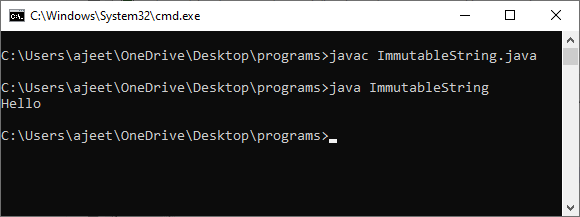Why Are Strings Immutable in Java? Ideal Practices and Usage Cases
Why Are Strings Immutable in Java? Ideal Practices and Usage Cases
Blog Article
What Is Immutable Strings and Just How It Works
In the world of shows, comprehending the concept of immutable strings is critical for developing durable and safe and secure applications. Immutable strings refer to strings that can not be changed after they are created, guaranteeing information integrity and predictability within the code.
The Basics of Immutable Strings
Immutable strings, as a basic idea in shows, are personality sequences that can not be changed once they are produced. This means that when a string is assigned a value, that value can not be altered. In languages like Python and Java, strings are immutable items, causing numerous implications in terms of memory administration and data integrity.
Among the vital benefits of unalterable strings is that they offer a complacency in data adjustment. Given that the web content of an unalterable string can not be customized, it makes certain that the original data continues to be intact, reducing the danger of unintended changes during program execution (Why are strings immutable in Java?). This residential property likewise streamlines debugging procedures, as designers can trust that once a string is defined, its worth will not be accidentally modified
When a brand-new string is produced based on an existing one, instead than changing the initial string, the brand-new worth is stored separately. Overall, understanding the fundamentals of unalterable strings is vital for grasping programming ideas and optimizing code performance.
Benefits of Immutable Strings
Building upon the security and performance benefits of unalterable strings, their benefits encompass improving code integrity and streamlining concurrent programming tasks. By being immutable, strings can not be modified after development, which eliminates the danger of unintentional adjustments in the data they store. This inherent immutability ensures that once a string is produced, its worth continues to be consistent throughout the program's execution, minimizing the possibilities of bugs triggered by unexpected changes.
Additionally, unalterable strings add to code reliability by making it simpler to reason about the state of a program. Given that strings can not be altered, designers can rely on that a string will always hold the exact same value, streamlining debugging and upkeep initiatives. This predictability brings about a lot more trustworthy and stable codebases.

Implementation in Programming Languages
Within various shows languages, the unification of immutable strings is an essential facet that influences just how information is taken care of and controlled within code structures. The implementation of immutable strings varies across different shows languages, with each language offering its own mechanisms to support this idea.

In contrast, languages like C and C++ do not have built-in support for unalterable strings. Developers in these languages need to by hand implement immutability by enforcing rules within their code to avoid direct alterations to string objects.
Finest Practices for Dealing With Unalterable Strings
When taking care of unalterable strings in shows languages like Java and Python, adhering to finest practices makes sure effective and safe and secure data manipulation. Among the vital ideal techniques is to utilize StringBuilder or StringBuffer as opposed to directly manipulating strings, particularly when handling substantial concatenation procedures. These classes supply mutable alternatives for string control, aiding to stay clear of unnecessary memory allowances and enhancing efficiency.
One more ideal method is to make use of string interpolation or format operates provided by the language instead of hand-operated concatenation. This click not just enhances readability but also aids in stopping common mistakes such as unintentional string modifications. Furthermore, when collaborating with sensitive data such as passwords or API secrets, it is important to avoid keeping them as ordinary text in immutable strings. Making use of secure storage mechanisms like char ranges or specialized libraries for taking care of sensitive information assists mitigate protection risks related to unalterable strings.
Real-world Applications and Examples
Exploring functional applications of unalterable strings in different industries exposes their substantial impact on information honesty and system integrity. In the healthcare industry, unalterable strings play an essential role in making sure the safety and discretion of individual information. By stopping unauthorized modifications to delicate details such as medical records and prescriptions, unalterable strings aid preserve conformity with stringent privacy laws like HIPAA.
Banks additionally profit from the unalterable nature of strings to boost the protection of client information and purchase records. Immutable strings aid protect against fraud and unapproved modifications to monetary details, offering a robust defense against cyber risks and making sure the trust fund and confidence of clients.

Verdict
To conclude, immutable strings are repaired and stable series of personalities that offer benefits such as thread safety and enhanced efficiency in shows. They are executed in different shows languages to make certain data integrity and safety. Ideal methods for dealing with unalterable strings consist of staying clear of straight alterations and using techniques that return brand-new string objects. Real-world applications of unalterable strings include information encryption, caching, and string manipulation tasks.
Immutable strings refer to strings that can not be changed after they are created, guaranteeing data stability and predictability within the code. When a brand-new string is produced based on an existing one, rather than modifying the original string, the brand-new worth is kept independently.In languages like Java and Python, strings are immutable by default, implying that as soon as a string item is produced, its worth can not be altered - Why are strings immutable in Java?. Best methods for functioning with unalterable strings include staying clear of straight modifications and using techniques that return new string objects. Real-world applications of immutable strings consist of data security, caching, and string adjustment tasks
Report this page